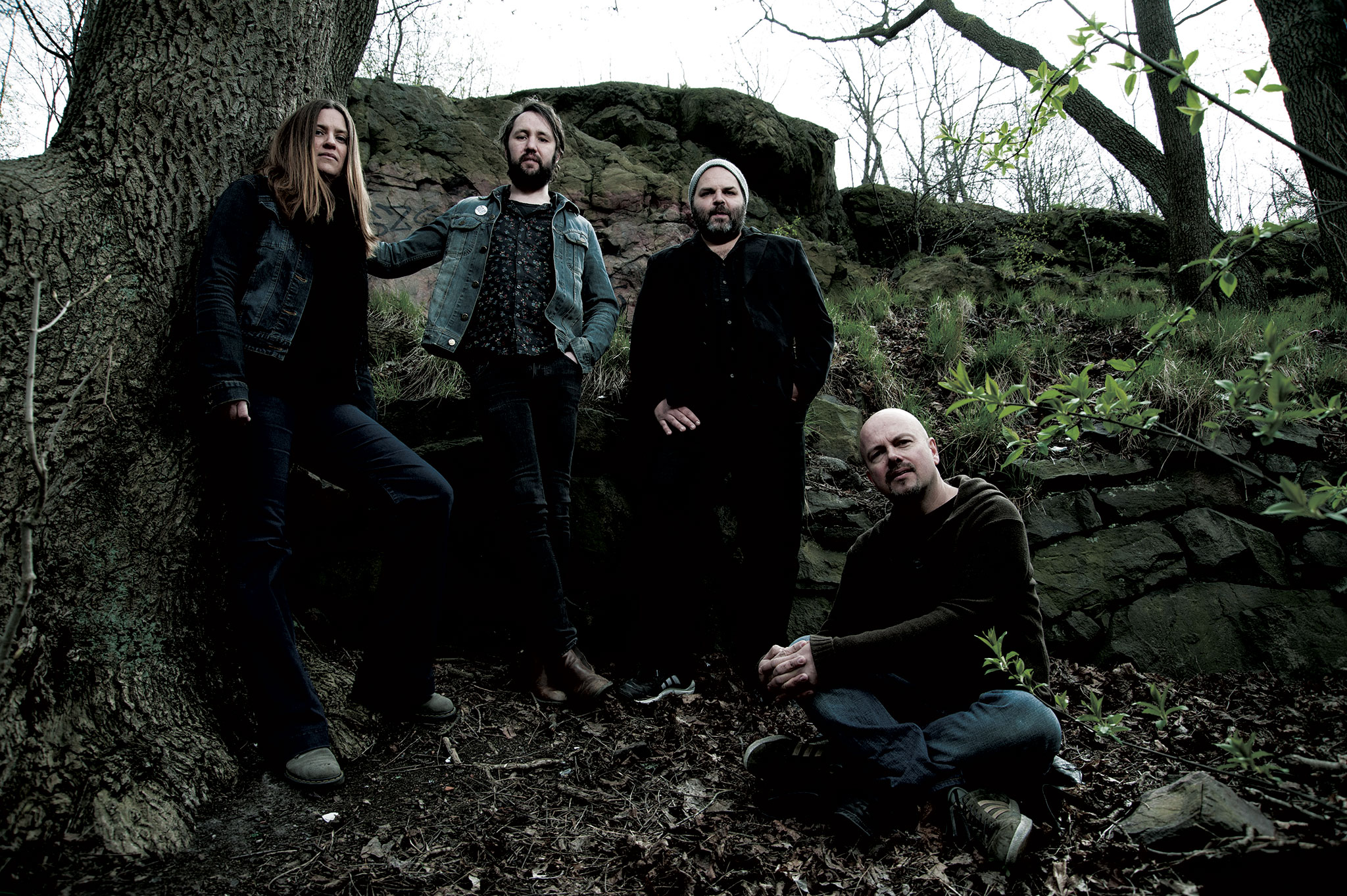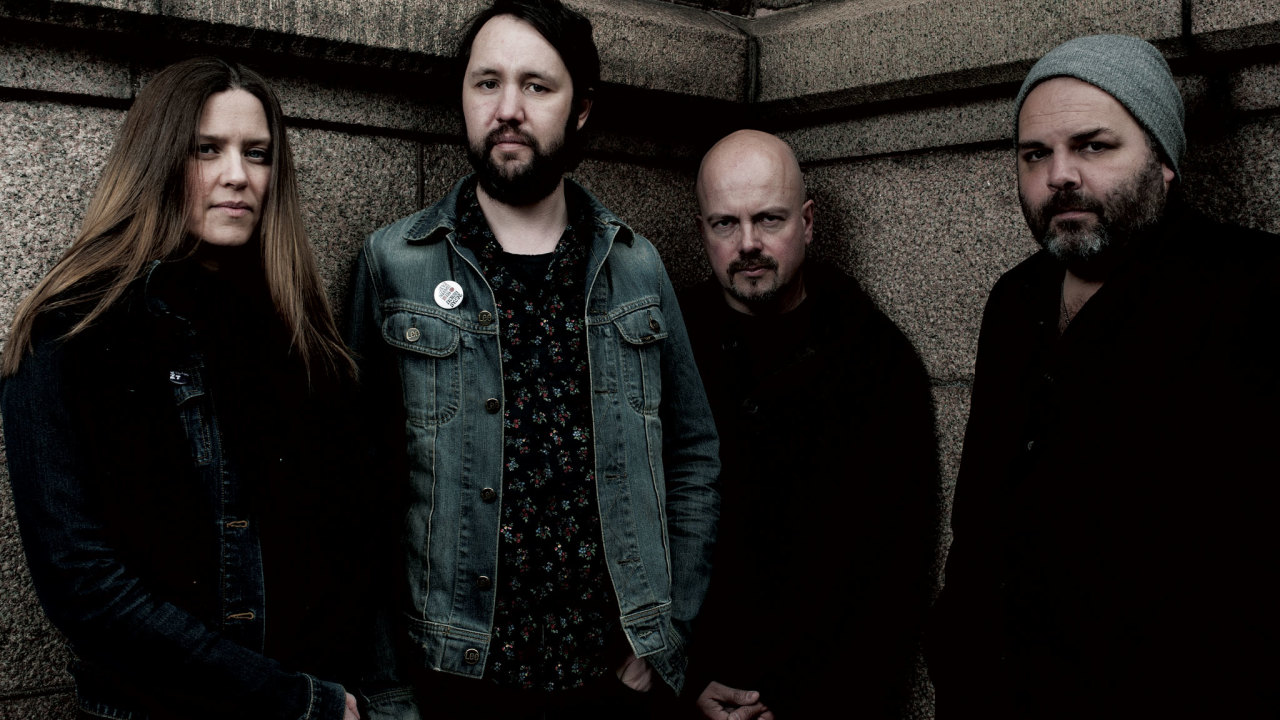Eight years is a long time in rock’n’roll. The last time Swedish progressive rock stalwarts Anekdoten released a studio album, this magazine didn’t even exist, which goes some way to explaining why this is the first time we’ve had the pleasure of chatting with their founder member Nicklas Barker. The sixth Anekdoten album, Until All The Ghosts Are Gone, sees the return of a band that were flying the flag for prog’s sonic ethics and aesthetic values way back in the early 90s.
Akedoten’s latest is an extraordinary record: sumptuous in design, wonderfully warm and organic in execution and possessed of songs that crackle with electrified elegance and verve. Thankfully, it has been worth waiting eight years for such a beautifully realised collection, but given the timescale, Nicklas Barker has some explaining to do.
“First of all, when we released A Time Of Day in 2007 it took maybe a year before we went on the road and started doing gigs,” he explains. “A lot of things happened during that time. We were having babies and starting families – the things that just happen – and it’s been hard for the four of us to meet up every day or even every week. That’s the bigger reason for the delay. Since it’s been like that, I’ve been focusing on other stuff. I’ve been playing with my band My Brother The Wind and making three albums.
“But we’ve been meeting up maybe two or three times a month and working together, doing stuff,” he continues. “Also, this album took a bit longer to record. We’ve been doing this for 18 months, which is ridiculous. Back in the day we used to go into the studio for three weeks and record an album and it would be mixed and done. But this album was made in two parts. It started off two years ago. We recorded the basic tracks for four songs. Then we went home and did overdubs and so on. It’s been taking a lot of time, but it’s been worth it.”
The prog rock renaissance has been ongoing for so long now that it might be hard for younger devotees to appreciate just how bleak things were in the early 90s. But it was into this hostile and disinterested environment that Anekdoten emerged. With very few exceptions – fellow countrymen Änglagård and The Flower Kings, the US contingent led by Spock’s Beard and, of course, our own Marillion – progressive rock was a brightly-coloured but nearly dead duck when debut album Vemod was released in 1993. Today, however, Anekdoten could be forgiven for feeling both vindicated and overdue some praise and recognition for their dedication to the cause. 2015 is a very different backdrop for the release of Until All The Ghosts Are Gone, and Barker is aware of the evolution his chosen genre has undergone. He’s also proud to have plunged deeper into the creative process.

“It’s been a long time, for sure,” he laughs. “What I notice now is that a lot of things have happened. There’s a lot more work when you release an album nowadays. I notice that the interest is much bigger than it used to be. A lot of things have happened with social media and the Internet, so there’s a lot more to think about than there was eight years ago.
“Meanwhile, I’ve changed my approach. When we started doing this record, I noticed that time flies. For me, personally, I would say I take things more seriously than I did 10 years ago. I believe that time is important. Also I noticed that this is something I like to do. I spent hours making this record and I enjoyed nearly every hour and every minute of it. I had fun and I learned so much, I developed as a musician and as a producer and someone who records music. So doing this is becoming more important.”
In the eight years since A Time Of Day, Anekdoten’s fluid formula of old school prog epics delivered via vintage equipment and with a dash of idiosyncratic flair has been hijacked and reshaped by countless new bands, few of whom have acknowledged the influence Barker’s band have had on the modern prog scene. It would seem reasonable for the Swedes to be slightly bitter about this state of affairs, not to mention a little possessive over a sound that they helped to revive and then redefine across their six albums to date. Ever the gentleman, however, Barker prefers to look inward, focusing on his own music and celebrating the unerring uniqueness of Anekdoten’s approach.
“The main inspiration for us is still my record collection,” he states. “I haven’t been into what has been happening in the progressive rock scene, really. Of course I know Mikael [Åkerfeldt] from Opeth and I noticed they changed their style on [2011’s] Heritage, and I can hear that Steven Wilson has been a bit more vintage at times. But I just write the songs that I like and the music I think is fun. I like to produce and arrange stuff with the old equipment. I prefer the old instruments and equipment. We have an identity that we’ve developed over the years. We’re not only a King Crimson clone band now. There are other big inspirations as well. The difference now is that you can’t just record some shitty sounds, put some Mellotron on it and release an album. I noticed when Opeth changed their direction, they raised the standards for this kind of music, so what I had to do is to work a bit harder to get things right. I can hear that on this new album.”
Perhaps the most obvious difference between Anekdoten and the countless retrogressive bands that have followed in their footsteps is that Barker and his comrades (bassist/vocalist Jan Erik Liljeström, keyboard wizard Anna Sofi Dahlberg and drummer Peter Nordins) have somehow managed to avoid falling into the trap of sounding like a straightforward tribute to the early days of progressive rock. Although still very much in thrall to King Crimson and other greats, the new Anekdoten material exudes an agelessness and vitality that no amount of wheezing analogue equipment and brown corduroy can diminish. There is a fine line between respectful assimilation and outright mimicry, and it’s a line that Nicklas has located and marked with casual authority.
“Yes, we have our instruments, which are old, but we use modern technology as well,” he shrugs. “I listen to modern pop music. I listen to Madonna! I like a lot of music from the 90s as well, like Pavement, Smashing Pumpkins and Sonic Youth. I’m not only listening to Genesis, Yes and King Crimson. We all listen to so many kinds of music. Ten years ago there was a lot of Beach Boys and psychedelic rock and West Coast music, but lately it’s been heavy metal and hard rock – Blue Öyster Cult, Black Sabbath, Iron Maiden, and UFO is a band I’ve discovered lately, too.
But the fine line? “We tried to record the album properly and we don’t worry about it sounding vintage. We worked with a guy [Simon Nordberg] who’s recorded some of the biggest albums in Sweden and he’s worked with everyone, including Britney Spears. When he started mixing the album, he got the music but he didn’t think ‘Oh, this must sound vintage’. He thought ‘This must sound good!’ and that’s the difference.”
Now that they are firmly back on track, with plans for several mini-tours during 2015 and a renewed sense of momentum propelling them forward, Anekdoten may now be able to receive both the recognition they deserve and to reach a much bigger audience than the almost secret cabal of prog aficionados that have followed them from the start. A profound sense of melancholy and longing hangs in the air as Until All The Ghosts Are Gone meanders through its sublime psychedelic vistas, but while the passing of time brings much sadness, it also generates a sense of urgency. Eight years is a long time and Anekdoten have some catching up to do. It’s a task they willingly embrace.
“If you think about the album title, there are certain things that happen when you’re in your 40s. You think about life and what’s happening and how the world looks, and you didn’t think about that when you’re young,” Barker concludes. “You have children and you have constant worries about them. It’s not a concept album really, but the songs do deal with life and society, getting older and people around you dying. All the rock stars die, Ronnie James Dio passed away… So it’s about that constant agony of losing people and, yes, I guess we are making up for lost time too.”
This article originally appeared in issue 56 of Prog Magazine.

